I hope everyone’s caught up on sleep after staying up for the GE2020 results on Friday night/Saturday morning!
For this week’s special issue, I co-wrote (actually, more like “added little bits”) this piece looking at influencers and their participation in GE2020 with Dr Crystal Abidin. For those who aren’t already familiar with her work:
Dr Crystal Abidin is a socio-cultural anthropologist of vernacular internet cultures, particularly influencer cultures, online visibility, and social media pop cultures. She has been tracking internet celebrity cultures in Singapore since 2008. Crystal is Senior Research Fellow & ARC DECRA Fellow in Internet Studies at Curtin University, and sits on the Executive Committee of the Association of Internet Researchers. Her books include Internet Celebrity: Understanding Fame Online (2018), Microcelebrity Around the Globe: Approaches to Cultures of Internet Fame (co-editor Brown, 2018), Instagram: Visual Social Media Cultures (co-authors Leaver & Highfield, 2020), and Mediated Interfaces: The Body on Social Media (co-editors Warfield & Cambre, 2020). Reach her at wishcrys.com.
This piece was first published (without any input from me!) as ‘How Social Media Influencers are Shaping Singapore's GE2020’ on 8 July 2020.
GE2006 saw the emergence of political bloggers who provided the general public with empirical evidence of opposition parties working the ground and attracting large crowds at election rallies. In GE2011, social media allowed the personalising of election candidates through personal updates and broadcasts that used parasocial relations to give impressions of intimacy. Non-mainstream and non-traditional media outlets and networks of social media estates allowed for a plurality of political voices to be contested online during GE2015. In the recent GE2020, though, influencers came to the fore.
Heading online in a pandemic election
More of GE2020 took place on social media platforms than in the previous elections. Called in the middle of the COVID-19 pandemic, at a time when Singapore was still being eased through a phased exit from a “circuit breaker” lockdown, traditional modes of political campaigning had to be reconsidered.
Walkabouts and house visits were allowed, albeit with masks on and safe distancing requirements in place. But physical rallies — a fixture of previous elections — were banned this year, forcing political parties to up their social media game. Candidates hosted talk shows, engaged on Instagram Stories, and gave speeches streamed on Facebook Live or aired as part of the officially allocated party and constituency political broadcasts.
These livestreamed engagements were then pored over, discussed, memed, and amplified by Singaporeans on platforms like Facebook, Twitter, and Instagram. Of course, the prevalence of election chatter on such social networks also meant the participation of influencers.
Influencer amplifications and endorsements
Social media influencers seem to have a bad reputation in Singapore, given an extended history of influencer wars, brand scandals, and faux pas. But beyond these clickbaitable incidents that are given disproportionate attention by the mainstream media and the longtail of online press, influencers are important facilitators of information in the age of misinformation and in social climates where governments hold excessive power over media control.
Influencers generally personalise, package, and perform snippets of their everyday lives ‘as lived’ to attract and accumulate followers on social media, then go on to monetise these audiences by embedding and astroturfing commercial messages into their lifestyle content. While some influencer personas are more open-ended and prone to bandwagoning on various topics and genres, others have specific causes attached to their public persona and may be more prudent in how they allow their brand to be monetised. Regardless, in a climate of information saturation, influencers are experts at soliciting and sustaining viewer attention through creative strategies enabled by a combination of social media platform features, local attention norms, and charisma. Many of them serve as ‘for hire’ loud hailers and amplifiers of information, whether the message is sponsored or not, and whether it involves promoting hair conditioner or human rights issues.
During the GE2020, Singaporean influencers who have long been passionate about and advocates for various social causes lent their platforms to politicians. For instance, Preeti Nair, who has used her platforms to bring attention to issues of racism and xenophobia in Singapore, pivoted her social media content to lend airtime and voice to specific electoral candidates.
In an online talk show with Progress Singapore Party (PSP) candidate Dr Tan Cheng Bock in his home, she and her intern Foo Wee San mobilised their Gen Z star power by guesting on the programme and using their platforms to publicise the party’s initiatives.
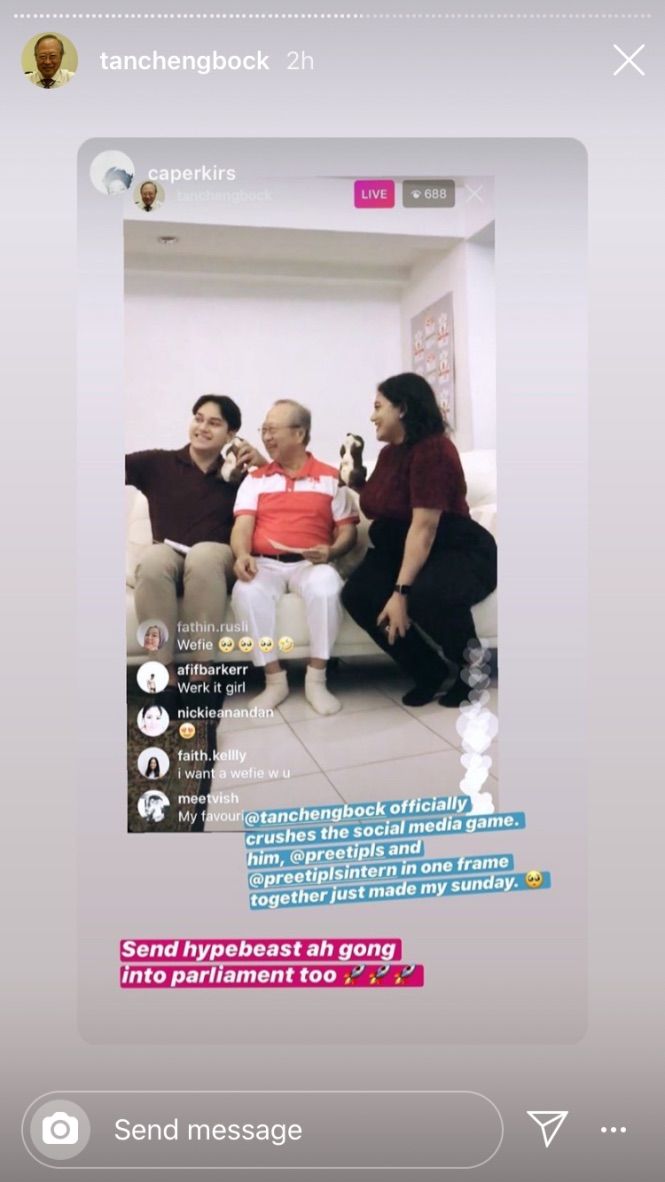
Preeti subsequently filmed an interview with Singapore Democratic Party (SDP) candidate Dr Chee Soon Juan at Bukit Batok MRT Station (where he eventually won 45.2% of the vote). Preeti also collected queries from her ~34,000 Instagram followers for an Instagram Live Q&A with SDP candidate Dr Paul Tambyah (Bukit Panjang SMC) and Singapore People’s Party candidate Jose Raymond (Potong Pasir SMC).
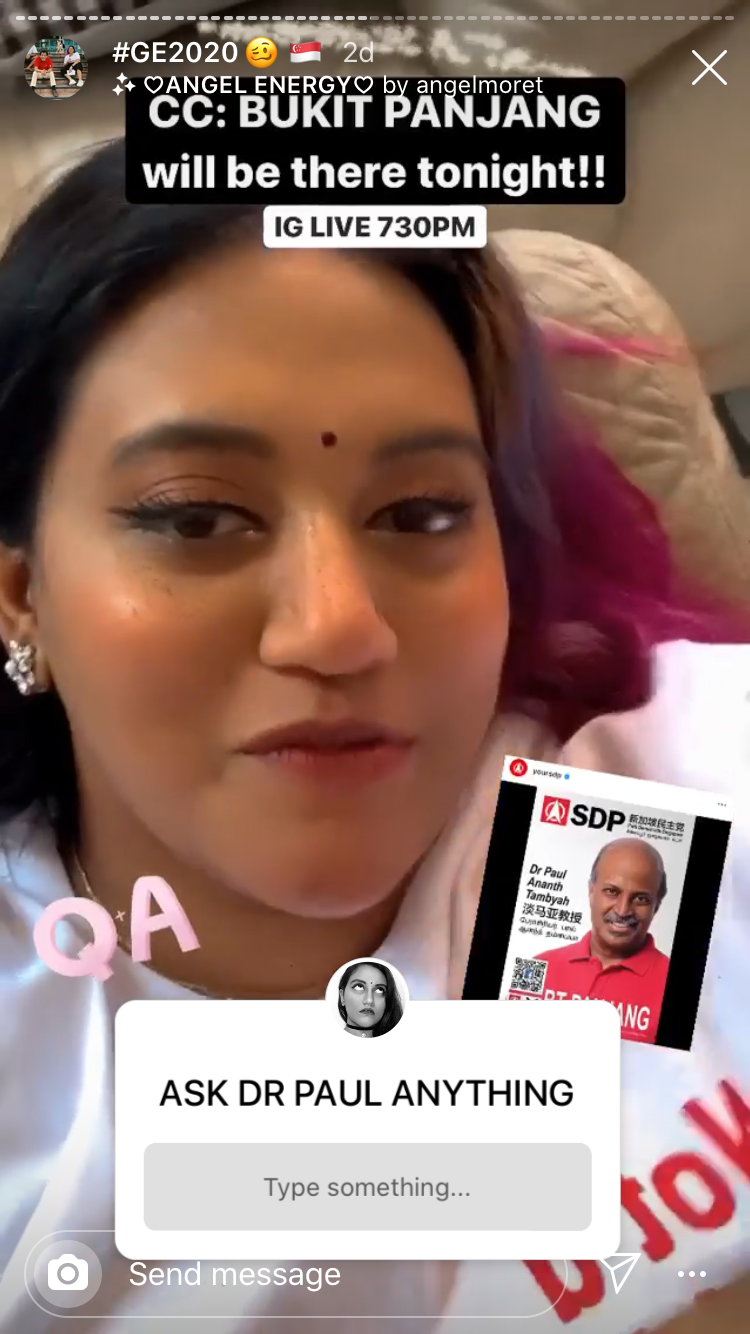
Each of these initiatives took on the tone of casual chats for Preeti’s wide and diverse network of followers to learn more about each electoral candidate, covering topics from their party manifestos to their personal interests as private individuals.
Comedian and entertainer Fakkah Fuzz, known for his ‘straight talk’ and risqué commentary on social life in Singapore, similarly publicised his interview with Dr Chee Soon Juan in his The More Better podcast, featuring a spectrum of queries from followers ranging from lighthearted personal anecdotes (eg. “What was his dream job growing up?”) to serious political conversations (eg. “Is Singapore ready to have a discussion about race without being POFMAed?”).
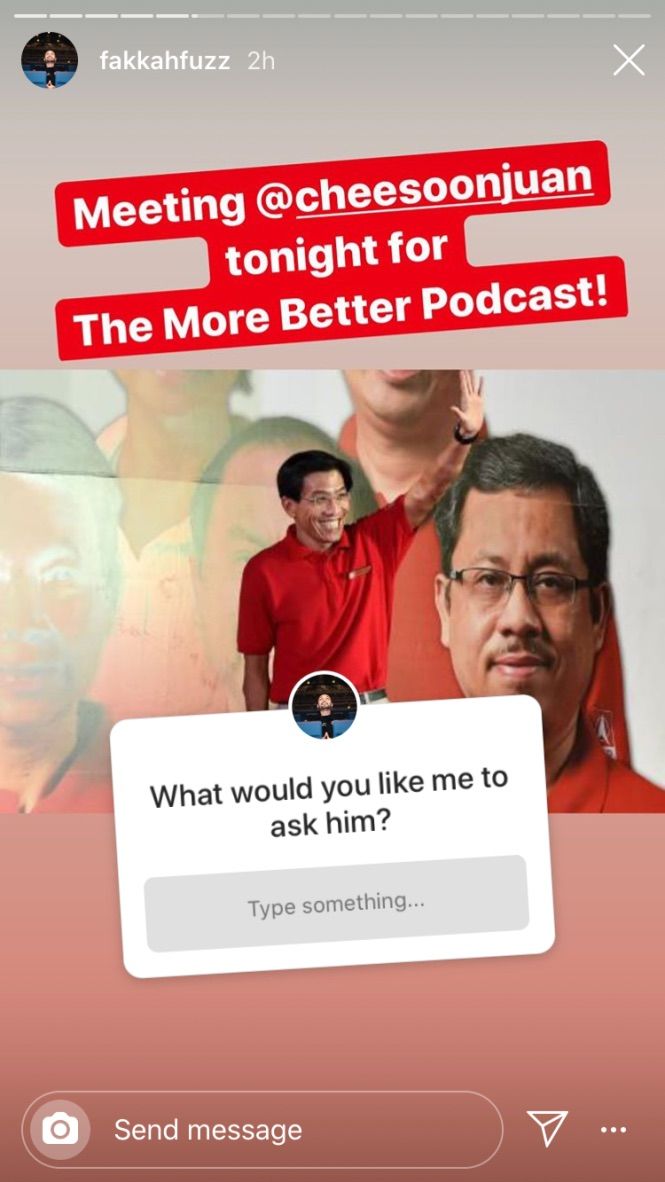
(It should be noted that many of these collaborations are late-notice occasions, given the very tight window of merely nine days for political campaigning.)
Levelling the playing field
Through legislation like the Newspaper and Printing Presses Act and the Broadcasting Act, successive People’s Action Party (PAP) governments have brought local traditional media outlets — newspapers and radio and TV news reporting — to heel. Opposition parties have thus had to turn to alternative outlets and platforms, such as social media, to reach Singaporeans.
Outside of the parties’ own digital marketing and outreach efforts, influencers have also played a part. By creating content to showcase opposition parties, socialising them among young and first-time voters more attuned to influencer messaging, and endorsing candidates through their neatly archived digital footprints, such politically active influencers are contributing to levelling the playing field against the incumbent party.
This is all the more persuasive when these endorsements and interventions are carried out by influencers with a credible and extended history of using their platforms as sites of resistance to “produce critical commentary about social issues, politics, and the state”, thus appearing to keep ‘on brand’ with their public persona, rather than merely bandwagoning on trending topics to extend their publicity.
Influencers as noise and distraction
Given the long history of influencer cultures in Singapore since the mid-2000s, the industry and ecology has also fast become oversaturated with contenders and contents. As such, a specific strategy that utilises shame and scandals for self-publicity has been oft used by many local influencers, in a trope known as the “shamelebrity”.
First studied among American pop culture in the 1990s, a shamelebrity is a person who, after being involved in an act of shame or scandal, is able to commodify their experience and rebrand themselves as being fully embracing of the shame cringe. Shamelebrity influencers openly court grief, scandal, and disputes, relying on the adage that ‘all publicity is good publicity’. From the early 2010s, such influencers have staged controversies and artificially augmented the importance and impact of such squabbles by fishing for hating, trolling, and flaming comments.
In GE2020, two Facebook posts from Workers’ Party (WP) candidate Raeesah Khan were reported to the police under Singapore’s Penal Code 298A which criminalises the act of intentionally “promoting enmity between different groups on grounds of religion or race”. While Khan subsequently apologised, the incumbent PAP’s call for WP to “state its stand” on the posts wrongly claimed that she had “admitted to making highly derogatory statements about Chinese and Christians”.
Many citizens who disagreed with the government’s continued oppression of minority voices took to social media to express solidarity with Khan through viral hashtags (eg. #IStandWithRaeesah, #InSolidarityWithRaeesah).
In response to this back-and-forth, influencer Wendy Cheng posted a series of Instagram Stories calling upon WP candidate Raeesah Khan to “stop trying to divide the nation with your race politics”, and for parties to “stop fielding radical feminists/leftists as candidates ffs we don’t need their poison infecting our politics” [sic].
In turn, a citizen filed a police report against Cheng for her past tweets, claiming that they were “trying to stir up anti-Indian sentiments”. Many young citizens took to Twitter and Instagram to condemn Cheng, including several viral threads “exposing” her for “racism and transphobia”. An online petition emerged calling for Cheng to be punished for “seditious content”; at the time of writing, it has over 23,000 signatures. Templates were also shared for people to urge brands and sponsors working with such influencers to “demonetise” them and be accountable to the public.
Yet, despite their well-meaning efforts, these actions only serve to fuel more online chatter and extend the shame cycle, especially when they result in trending hashtags or keywords. As a substitute, media studies scholars have observed a series of circumvention techniques that allow conversation to flourish and be documented without needlessly amplifying a source text, including “Voldemorting” (avoiding the mention of keywords to reduce searchability and break connections to the source) and “screenshotting” (reproducing content through pictures to avoid increase traffic to the source). But perhaps the most effective strategy is simply to starve these shame cycles of attention, by unfollowing them.
It should be underscored that online media outlets who milk influencers’ petty incidents for viewership are also complicit in encouraging this culture. Besides magnifying publicity for such influencers through dedicated articles (that are often mere compilations of social media screengrabs with light commentary surmising the posts), such outlets extend the shelf life of public interest in these petty incidents. This also detracts online attention from other worthy causes, whose messages are often overshadowed by tabloidesque distractions.
Politicians adopting influencer strategies
Many established influencer strategies have also been taken up by politicians. PAP candidate Baey Yam Keng has long established his social media presence, especially on Instagram, through his charismatic engagement with young people. Utilising strategic selfies, hashtag challenges, social media conversations, and revelations into the ‘backstage’ of his job as a politician, he demonstrates a “human touch” and softens citizen impressions that the incumbent government is authoritarian and paternal. In GE2020, he took to TikTok to share snippets of his campaign progress, and accumulated warm responses from users in the comment sections.
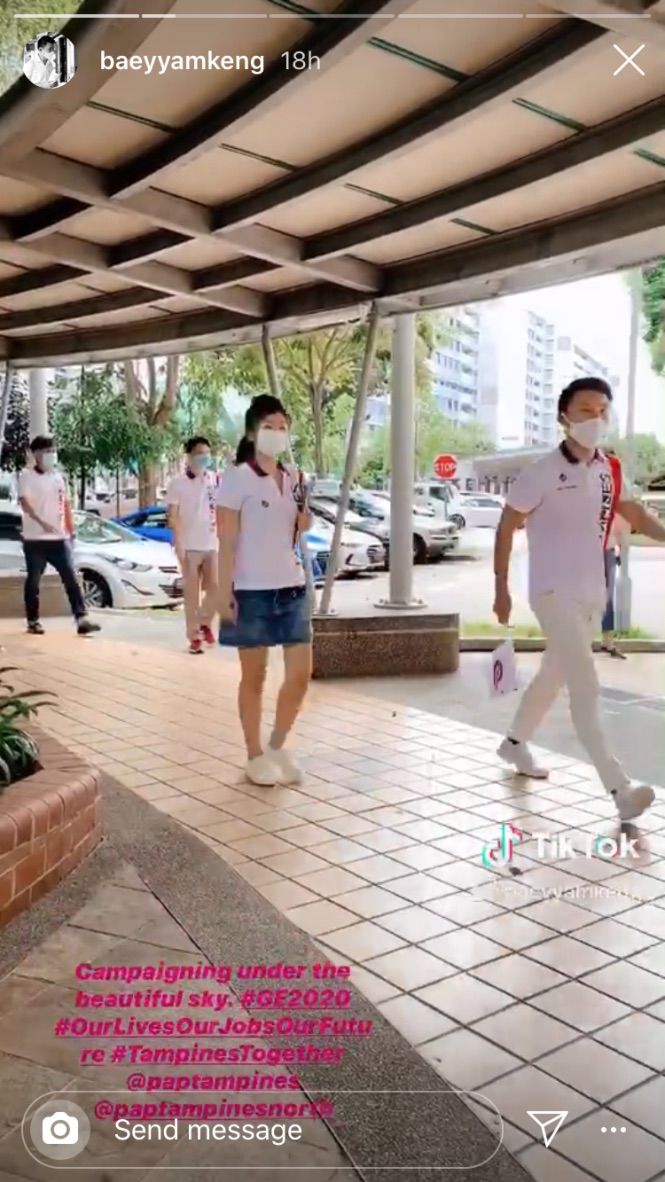
WP candidate Nicole Seah was also strategic with posting ‘regrammable’ posters bearing her face and soundbites from her speeches for easy circulation among interested citizens, as well as making the effort to respond to Insta-DMs and reposting posts and selfies whenever tagged by citizens.
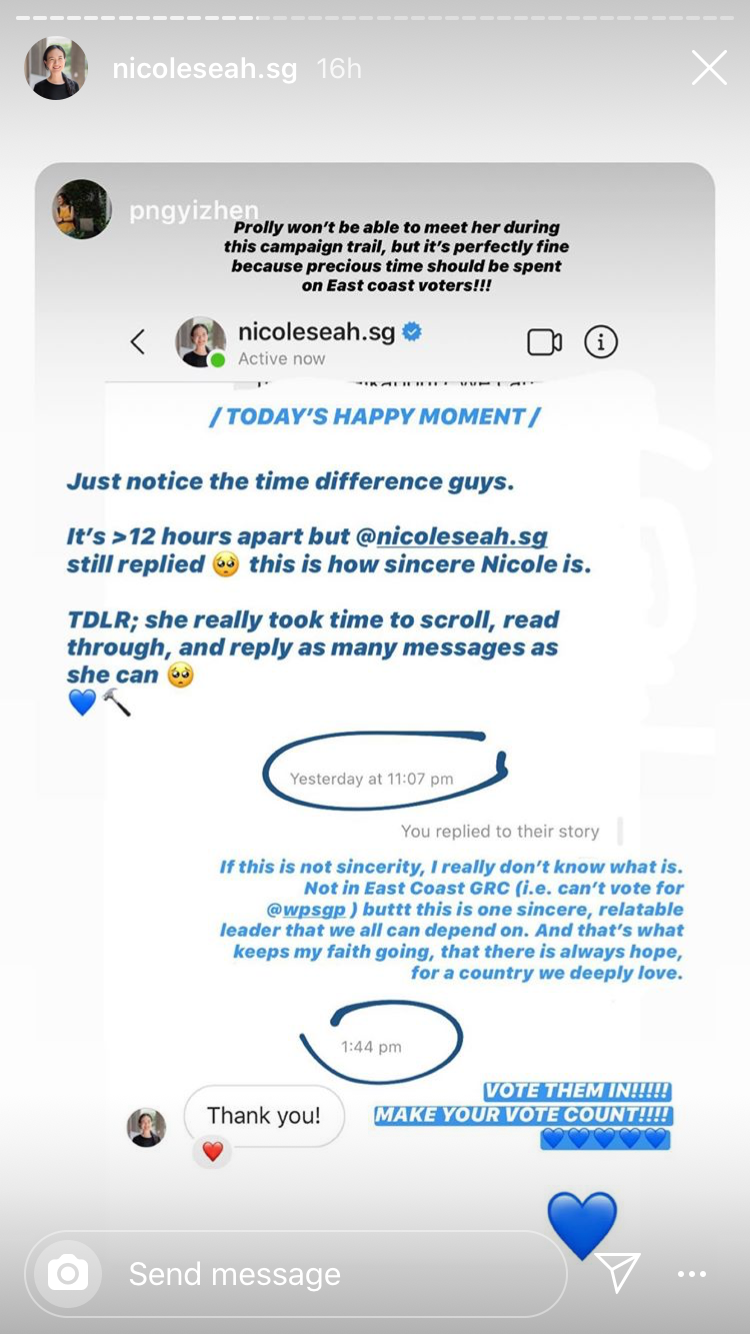
SDP’s Dr Chee Soon Juan engaged in spontaneous and light-hearted Instagram Questions, posting short video responses on Instagram Stories interspersed with behind-the-scenes footage of his on-foot campaigning. Fun Gen Y and Gen Z queries have included his opinions on bubble tea, whether he likes K-pop group BTS, and whether he would oblige followers in doing a TikTok.
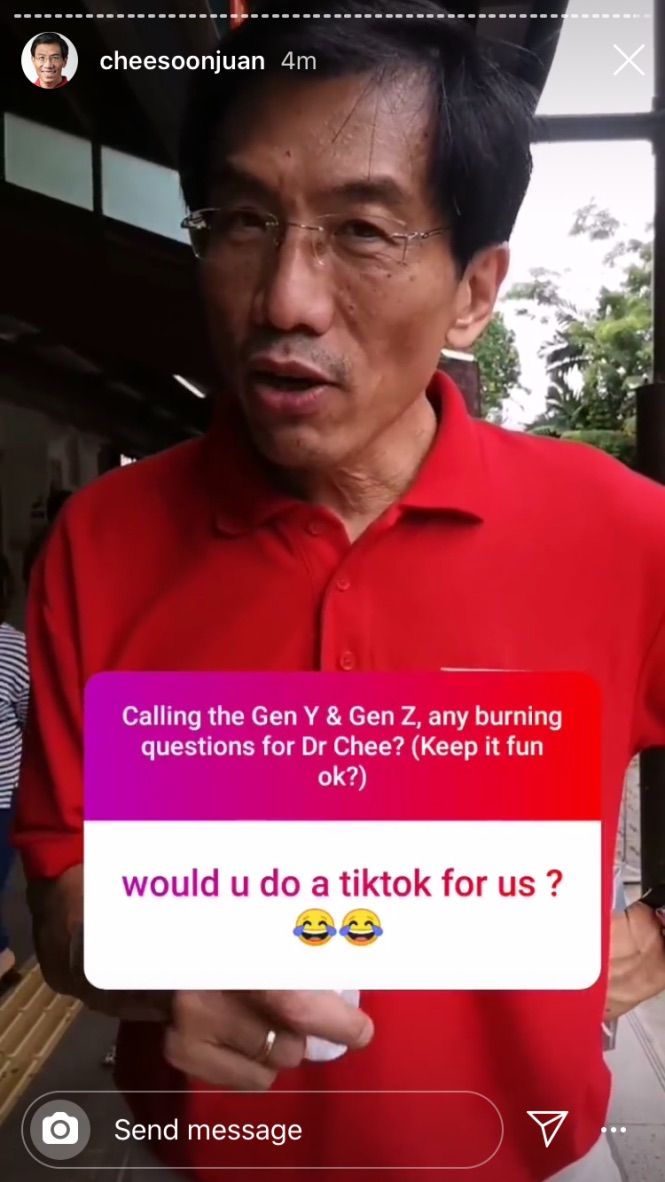
But perhaps the most outstanding forerunner who conscientiously adopted influencer strategies for social media campaigning was PSP’s Dr Tan Cheng Bock. The 80-year-old political veteran took to Instagram to connect with younger voters, displaying extremely high reciprocity and spontaneous feedback through hundreds of replies, shoutouts, @mentions, and even personalised thank you notes and videos sent via Instagram DMs.
In one Instagram video, he thanked supporters by their Instagram handle, spelling out and vocalising complicated l33tspeak, much to the delight of followers whose support and endearment towards him only seemed to escalate.
Dr Tan’s debut on Instagram Highlights alone demonstrated the variety of influencer norms he’d replicated: “Memes”, where he archives the meme macros that users have made of him; “Heartshape”, where he reposts images of citizens showing him finger hearts, and responding to his Instagram template calling for users to complete his one-handed half heart; “Flower”, where he displays the flowers in his garden in true blue ‘Facebook auntie’ style; and a series of other themed highlights documenting young people’s social media-based comments and feedback in support of him and his campaign.
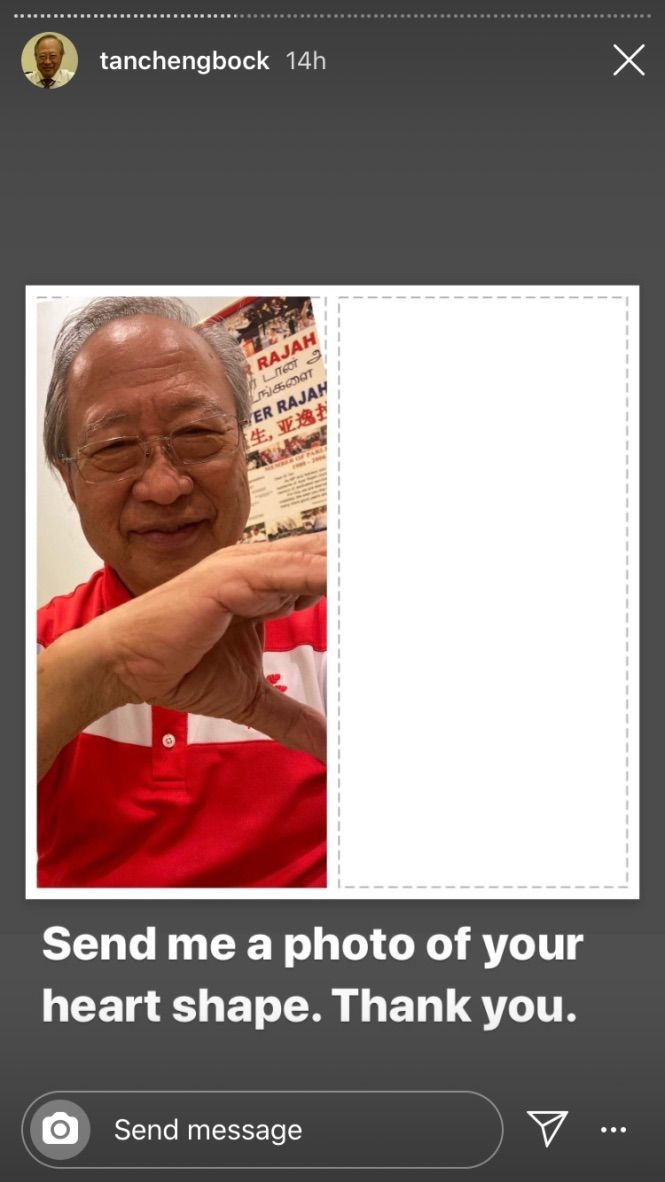
Dr Tan’s earnest learning journey and interactions on social media commodified a geriatric cuteness that romanticise elderly users’ steep learning curves with technology. His missteps with youth lingo (eg. “hypebeast”, “woke”, “shoutout”) were perceived as sincere attempts at relating to young people, and seemed to appeal to their maternal instincts; as one comment revealed: “... reminds me of my grandma… Can’t help but feel protective in that sense”.
Thousands of comments from young people on social media acknowledged Dr Tan’s efforts with technology, which they took to be indicative of his desire to strive for the country as a political candidate as well. He was described as “cute”, “endearing”, “friendly”, and “nice”, alongside testimonials that acknowledged his efforts towards “life-long learning”: “I think it’s so inspirational for an 80 year old grandpa to embrace new technology and relate to millennials… He’s not even a boomer, he belongs to the WW2 era!”; “Can’t believe he’s learning how to use social media to connect with the voters despite his age”; “I find it so endearing for him to be learning the ropes of social media at his age.”
Perhaps there is no better evidence of Dr Tan’s success with leaning into influencer techniques than the nickname he gained and carried with pride throughout this recent campaign period: “Influencer ahgong”.
I hope you found this informative and interesting! Feel free to share it:

